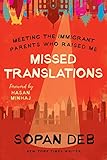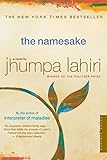 I first met Sopan Deb in 2020 when I moderated a virtual panel called Brown in America: Community, Culture, and Code, hosted by San Antonio’s Malvern Books. Deb had just published his first book, a memoir, Missed Translations: Meeting the Immigrant Parents Who Raised Me. Missed Translations is a breathtaking read about the contradictions in Deb’s upbringing. He had an all-American suburban childhood in New Jersey, yet was raised by Bengali parents who both drifted away from him by the time he became a young adult. Far from being a paean to loss, Missed Translations is a compassionate, at times humorous, recounting of Deb’s adult efforts to reconnect with both parents, now living worlds apart.
I first met Sopan Deb in 2020 when I moderated a virtual panel called Brown in America: Community, Culture, and Code, hosted by San Antonio’s Malvern Books. Deb had just published his first book, a memoir, Missed Translations: Meeting the Immigrant Parents Who Raised Me. Missed Translations is a breathtaking read about the contradictions in Deb’s upbringing. He had an all-American suburban childhood in New Jersey, yet was raised by Bengali parents who both drifted away from him by the time he became a young adult. Far from being a paean to loss, Missed Translations is a compassionate, at times humorous, recounting of Deb’s adult efforts to reconnect with both parents, now living worlds apart.
Deb’s first novel, Keya Das’s Second Act, published earlier this month by Simon & Schuster, is grounded in tragedy, but is ultimately a story of redemption. When the novel’s titular character dies in a car accident just after she’s come out to her parents as gay, her family—who was horrified by her revelation—is destroyed by her sudden death. Keya’s father, Shantanu, discovers a script that Keya and her girlfriend Pamela had been writing and shares his discovery with his ex-wife Chaitali and their remaining daughter, Mitali. Along with Pamela, Shantanu and Mitali bring the play to life as an affirmation of their lost loved one.
In addition to being an author, Deb is a basketball writer, contributor to the Culture section of the New York Times, and a stand-up comedian. Curiosity and humor mark his writing, which centers flawed, lovable characters. I caught up with him by email.
Martha Anne Toll: What was the inspiration(s) behind Keya Das’s Second Act?
Sopan Deb: I began writing the novel in the summer of 2020. After the release of my memoir, Missed Translations, I wanted to write something that dealt with grief and redemption. It could also have been the pandemic. Redemption is an interesting topic to me. Are we a forgiving society? I think many of us like to think we are, but I’m not so sure of that. I’ve also been interested in South Asian family dynamics and wanted to explore a split family and what it would take to bring one back together. Finally, this particular story is inspired by the real-life interaction of a Bengali friend of mine, who had a difficult coming out experience with her parents.
MAT: This book has a dark premise at its center, the death of a daughter, and parents’ inability to accept their child’s choice in love. Can you talk more about that and why it matters to you?
SD: My parents were arranged to get married. More specifically, my mother was pressured into marrying my father. This wasn’t unusual culturally at the time. But the natural progression is that when the next generation grows up here in the United States and are surrounded by choice, it can be difficult for my parent’s generation to adapt, particularly those of South Asian descent. I’m not saying that’s right or wrong. It just is. I think about “choice” a lot. I think I take “choice” for granted. For my parents, “choice” isn’t a word they knew a lot about. In terms of Keya Das, I do think a certain subset of South Asian parents still struggle with LGBTQ issues. It’s a generational issue, but also a cultural one. Remember, it was only in 2018 that India struck down its sodomy law.
MAT: You have a lot to say about the current dating scene for younger and older people.
SD: One of the most interesting relationships for me is the one between a character named Chaitali and Jahar. Chaitali is divorced and remarries Jahar, who was also previously married. It’s incredibly unusual for South Asian marriages to end in divorce. There’s a stigma to it. It’s partially why my parents stayed married for so long, despite having a difficult marriage, which ultimately ended after 30 years. I wanted to explore a different type of dating. We rarely see middle-aged dating depicted with characters of South Asian descent in literature, so I wanted to give it a shot.
MAT: In addition to their dating life, Mitali and her father have many other parallels. Can you talk about that?
SD: When we meet them, these characters are both fundamentally broken human beings floating through life without purpose. They see themselves as empty shells and act like it. Ideally, they would deal with the emptiness together. But they blame themselves so much for Keya’s death that they don’t feel they deserve any sort of companionship. They likely model handling loss after each other. Deep down, they’re loving people with huge regrets about not expressing that love enough. There’s a lot of self-loathing there, combined with a huge capacity to love. (We see hints of that through their interactions with Kalpana, Mitali’s grandmother and Shantanu’s mother.) They also both have a resentment of Chaitali, although it’s an unfair one. Finally, I also think Shantanu and Mitali very much crave the adoration of the other one.
MAT: How did your experience with the publication of Missed Translations, a memoir, inform this novel? This is your first novel, how was that process different as well?
SD: Writing my memoir essentially gave me the confidence that I could write fiction. I learned a lot about my own voice in writing Missed Translations, including what I’m good at and what I’m not so good at. I would definitely write the memoir differently today because I think I’m a better writer. The biggest adjustment was being able to make things up in the novel. As a journalist, my mind is trained to be accurate about all things. In fiction, you could make up an entire planet if you want to. (I didn’t do that.) That took some getting used to. In the memoir, I was mostly focused on my own story, whereas in the novel, I had to think about how to serve several characters.
MAT: Do you feel Keya Das’s Second Act shares any connective threads with Missed Translations?
SD: Definitely. For one thing, the concept of a split South Asian family. I’m very familiar with that from my own family. But also, there are several scenes with a therapist in the novel. One of the concepts I discuss in Missed Translations is how mental health treatment is often stigmatized in South Asian communities. In Keya Das’s Second Act, I wanted to explore what it might’ve been like if someone of my parents’ generation went to see a therapist. There’s also the concept of what it means to achieve the American Dream. The opening scene features Shantanu looking out onto a barely maintained lawn, while his white neighbors have perfectly green lawns. My father, who grew up in India, worked for years to have a perfect lawn when I was growing up. He never quite got there. It’s emblematic of what his life was like in America. Beyond that, both books partly take place in the New Jersey suburbs, where I grew up, and feature the Bengali American community I grew up around heavily.
MAT: You have wonderful and humorous insights into being part of an immigrant family in America. You’re through and through an American, but some Americans may not see you that way. Can you talk about this?
SD: This is an interesting question. When I covered the Trump campaign as a politics reporter, I was told to “go back to Iraq” by a Trump supporter at a rally, followed by someone else asking if I was a member of ISIS. Those were jarring moments and a reminder that in some eyes, I will never be a true “American,” whatever that means. I think it’s important to remember that when someone is deemed “other” or “un-American,” it’s not just about bigotry or citizenship. It’s often political disagreement being funneled into something else. I remember being angry in those moments, but the anger quickly dissipated. The way I look at it, I don’t feel the need to defend or discuss how American I am. I was born in Lowell, Massachusetts. That’s the end of the discussion for me. If it’s not, it says more about the person who thinks otherwise than me.
MAT: You don’t translate or provide background on the Indian holidays that are important in this book, particularly Durga Puja. What was behind this decision?
SD: I didn’t feel the need to, truthfully. It makes the book feel “otherized,” if that makes sense. If I read a book that features a reference to Christmas, I don’t need Santa Claus explained to me. I tried to leave enough context for the reader to understand, but ultimately, this isn’t a book mainly about religion.
MAT: Your day job is as a sportswriter—does this influence your fiction writing at all?
SD: It sounds simple, but as a writer for the Times, I’m able to keep my writing sharp because I have to do it so often. Since everything is extensively edited, you’re constantly reminded what is and isn’t good writing. Obviously, I have more leeway in the type of voice I use when I’m writing fiction, but being a journalist allows me to keep my storytelling skills, to the extent I have them, in as good a shape as possible.
MAT: Have any books in particular influenced your writing life?
 SD: This may be a cliched answer for a South Asian writer, but it’s true: Jhumpa Lahiri’s works were profound for me, particularly The Namesake. Her short story collections as well. I had never seen Bengali characters brought to life like this before. It made me feel like I was reading about my own family and conversely, gave me the push to write about my own experiences. An amusing story my parents told me—they knew her family before I was born and used to spend time with them. They told me this while I was in the process of writing Missed Translations. My mother said something like, “I heard Jhumpa became a writer or something,” which made me laugh. Yes, Mom! Jhumpa Lahiri more than “became a writer.” That’s how I knew it wasn’t made up.
SD: This may be a cliched answer for a South Asian writer, but it’s true: Jhumpa Lahiri’s works were profound for me, particularly The Namesake. Her short story collections as well. I had never seen Bengali characters brought to life like this before. It made me feel like I was reading about my own family and conversely, gave me the push to write about my own experiences. An amusing story my parents told me—they knew her family before I was born and used to spend time with them. They told me this while I was in the process of writing Missed Translations. My mother said something like, “I heard Jhumpa became a writer or something,” which made me laugh. Yes, Mom! Jhumpa Lahiri more than “became a writer.” That’s how I knew it wasn’t made up.









